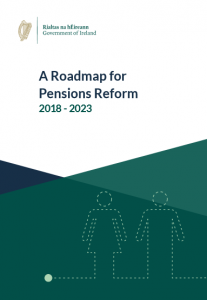What is the Pensions Time Bomb I hear you ask?
Excluding public sector workers, who have close to full pension coverage, the private sector figure is only approximately 37% coverage. This means that nearly two thirds of private sector workers are reliant on the State Pension when they retire. Of those with a private pension, its adequacy to provide a meaningful income in retirement is another question.
“With this level of reliance on the State Pension it must be very well funded” I hear you exclaim!
No, it’s not. We pay PRSI contributions and the State promises to pay us a pension, to replace our income when we are no longer working. Currently the full contributory State Pension for an individual will be €12,651.60 per annum (€24,070 for married couple). However, the State does not set aside money to meet this promise. They pay it from the exchequer (tax take) in the year it falls due.
What is wrong with this?
 Currently there are about five people working and paying tax for every person in receipt of the State Pension – but a shift in the demographic means that by 2025 this demographic is moving in the wrong direction and by 2050 that could be about two people working for every retired person. This puts a significant pressure on the State’s finances. Of course, we have known this for some time and an OECD report in 2012 highlighted this and recommended the implementation of a later state pension age and the establishment of a mandatory pension scheme for all workers.
Currently there are about five people working and paying tax for every person in receipt of the State Pension – but a shift in the demographic means that by 2025 this demographic is moving in the wrong direction and by 2050 that could be about two people working for every retired person. This puts a significant pressure on the State’s finances. Of course, we have known this for some time and an OECD report in 2012 highlighted this and recommended the implementation of a later state pension age and the establishment of a mandatory pension scheme for all workers.
The State Pension age was indeed pushed out. The qualifying age is currently 66; it will increase to 67 years in 2021 and to 68 years in 2028.
The Pension Roadmap, published this year outlines a new auto enrollment pension system, with public consultation to begin Q2 2018. Within the Pension Roadmap, it outlines that consideration is being given to an employee/employer matching contribution structure up to 6% of gross salary with a State contribution representing one third of employee contributions. This level of funding is likely to be very short of what is required in retirement.
Therefore, in summary, the Pension Time bomb means there are too many people relying on too little money in retirement.
So how does this link to the Housing Crisis and in particular, the Rental Sector?
Well with rent in Dublin averaging at €1,875 per month, an individual renting in Dublin today and retiring on the State Pension alone is already in deficit of €9,848.4 before any other expense, including food. What happens then? If a married couple or two people sharing a two-bed apartment at an annual cost of €22,500, and a combined State Pension income of €24,070 are left with only €1,570 to live on for the year.
February, RTE published a DAFT report citing the cheapest place to rent in Ireland is Donegal, with average rent of €599 per month; a retired individual might fare better financially there, having a monthly surplus of €455. Except for the fact that it is the cities that are most densely populated and with the highest rents (Q4 2017 Dublin: €1,822, – Cork: €1,180, Galway: €1,096, & – Limerick: €1,004. Daft.ie).
A bleak future for some
The year 2050 is 32 years away, which seems like a long time. However if you think of it like this, a 36 year old today, paying excessively high rent and so is unable to save for a deposit for a mortgage and perhaps even a pension contribution, is the person who may be reliant on the State entirely in retirement and for far more than just rent. We have seen above that even paying the pension is a strain, so if there is a significantly increasing number of retirees solely reliant on the State for everything else, well, that creates a social landscape that looks very bleak.
This housing crisis does not simple affect low paid workers in 2018 it has the potential to affect an entire country, albeit far into the future. It is the decisions made today as a society that will change what that future looks like. Furthermore, it is the decisions you make today, as an individual that will determine what your own future looks like.
Here to help you navigate your way to financial security.
The Milestone Advisory team are qualified financial services consultants. We specialise in helping professionals in the construction sector and related industries. Our team will work with you to review your finances, explaining your options in clear English.
No jargon – just the facts.
For further information please contact Susan O’Mara via email or phone: (01) 406 8020. Milestone Advisory DAC t/a Milestone Advisory is regulated by the Central Bank of Ireland.





